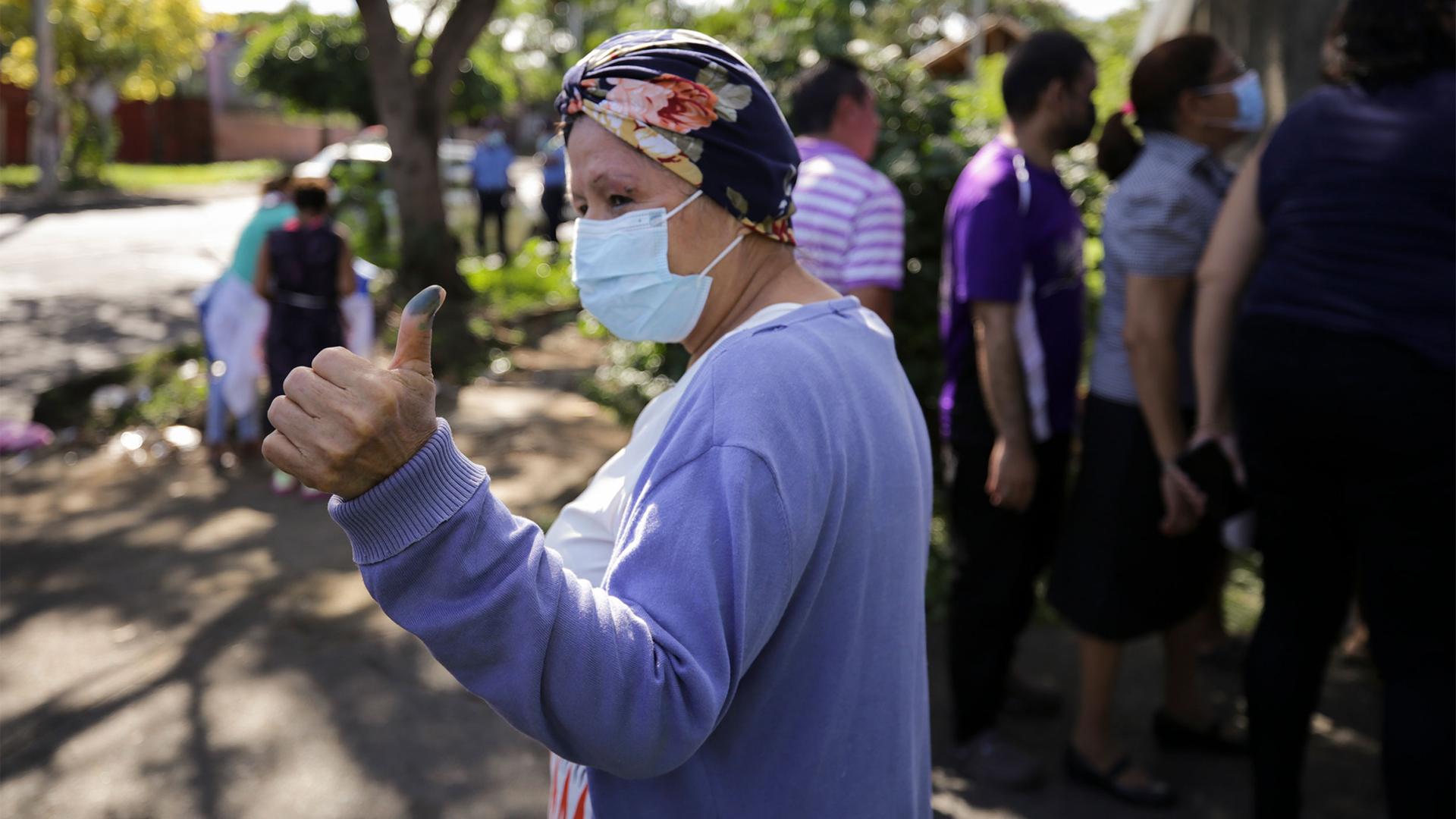Nicaragua’s Ortega leads in vote tally after jailing rivals
A woman shows her ink-stained finger after casting her vote during general elections in Managua, Nicaragua, Nov. 7, 2021.
Nicaraguan President Daniel Ortega was ahead by a wide margin Monday in his bid for a fourth consecutive term in preliminary vote tallies for an election widely considered rigged.
Ortega had received 75%, an apparently insurmountable total, with nearly half of polling places counting, said Brenda Rocha, president of the Supreme Electoral Council. Trailing far behind were a handful of little-known candidates.
The strongest potential opponents were in jail rather than on the ballot.
At the close of voting Sunday, the US President Joe Biden called the election a “pantomime.” The country’s opposition had urged voters to boycott and voting Sunday appeared light, despite Rocha’s report of a turnout of 65%.
The European Union foreign policy chief, Josep Borrell, dismissed the results on Monday.
“Daniel Ortega has eliminated all credible electoral competition, depriving the Nicaraguan people of their right to freely elect their representatives,” Borrell said in a statement. “The integrity of the electoral process was crushed by the systematic incarceration, harassment and intimidation of presidential precandidates, opposition leaders, student and rural leaders, journalists, human rights defenders and business representatives.”
He said the EU had so far avoided sanctions that would affect the Nicaraguan people, instead targeting those “responsible for antidemocratic developments in Nicaragua.” But he warned additional measures could go beyond individual restrictions.
Ortega had railed against alleged interference by Washington and other “powers” in Sunday’s elections to determine who holds the presidency for the next five years, as well as 90 of the 92 seats in the congress and Nicaragua’s representation in the Central American Parliament.
The ruling Sandinista Front and its allies control the congress and all government institutions. Ortega, who turns 76 on Thursday, first served as president from 1985 to 1990 while battling US-backed rebels. He returned to power in 2007. He recently declared his wife, Vice President Rosario Murillo, his “co-president.”
Voting closed Sunday evening without reported incidents.
In June, police arrested seven potential presidential challengers to Ortega on charges that essentially amount to treason. Some two dozen other opposition leaders were also swept up ahead of the elections.
The remaining contenders on Sunday’s ballot were little-known politicians from minor parties seen as friendly to Ortega’s Sandinista Front.
On Sunday, Mayela Rodríguez found her local voting center at a school in Managua virtually empty. “In past years it was really full,” she said. “Before you had to (wait) in a big line to come here and now, empty.”
Around midday, Ortega spoke live on television after voting — he held up his inked finger.
He blasted the United States for interference in Nicaragua, noted allegations of fraud in the last US presidential election, reminded that those who stormed the US Capitol were called terrorists and remain jailed. He repeated his claim that the US government supported huge protests in Nicaragua in April 2018, which he has called an attempted coup.
“They have as much right as we do to open trials against terrorists,” Ortega said.
In a statement released around the close of voting, Biden called Nicaragua’s election process “rigged” and said the US would use the tools at its disposal to hold the Nicaraguan government accountable.
“The Ortega and Murillo family now rule Nicaragua as autocrats, no different from the Somoza family that Ortega and the Sandinistas fought four decades ago,” Biden said.
He criticized the vote as a “pantomime election that was neither free nor fair, and most certainly not democratic.”
In neighboring Costa Rica, President Carlos Alvarado Quesada tweeted that his government won’t recognize the election because of “the lack of democratic conditions and guarantees.”
The Organization of American States will hold its annual general assembly in Guatemala later this week. Guatemala, Honduras and Mexico were among seven countries that abstained from a vote on a resolution last month in the OAS condemning repression in Nicaragua.
Associated Press writer Christopher Sherman in Mexico City contributed to this report.
